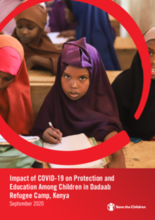Save the Children conducted research in three refugee camps in Dadaab in Kenya which explored the impact of COVID-19 on children’s education, young mothers’ livelihoods and gender-based violence. This study highlights programmatic adaptations made in response to COVID-19, identifying what has worked well or less well and considers practical recommendations for the sector. The research gathered views from children, young mothers, caregivers and key stakeholders working in child protection and education in the camp. This study found that:
- The majority of children are still learning at home, predominantly through radio lessons. However, a lack of learning materials (including radios and solar lamps) is a substantive barrier for others.
- Young mothers especially have struggled to access necessary social and economic support as they have been unable to earn an income or socialize with their peers.
- Gender-based violence has intensified as a result of COVID-19 measures. Domestic violence and sexual harassment were the main forms of violence experienced. This has been made worse by a lack of available services, which have either closed or reduced staff.
- Restrictions in movement also reduced the ability for child protection actors to deliver general services. Yet, agencies continue to try innovative approaches to support the community in stopping the spread of COVID-19 including - telecoms counselling sessions and awareness-building radio sessions. Children and caregivers themselves called for Personal Protective Equipment (PPE) for example masks and hand sanitizers to support them in their daily lives.
This study underscores the need for continuous support to these communities. The provision of facemasks, hand sanitizers and handwashing kits remain of crucial importance to ensure their safety and minimize the transmission of COVID-19.

